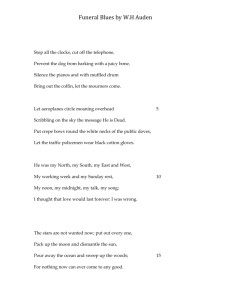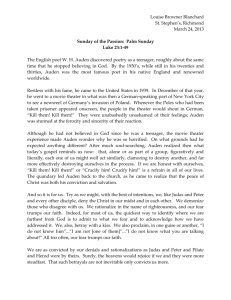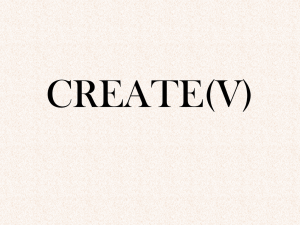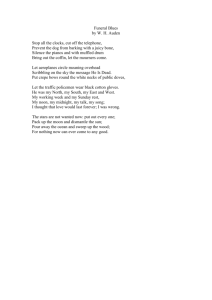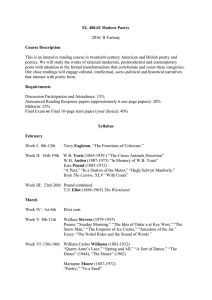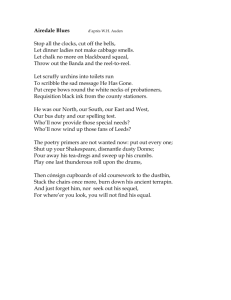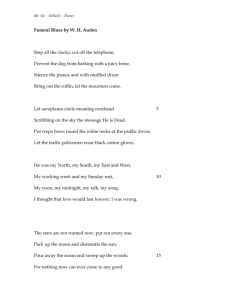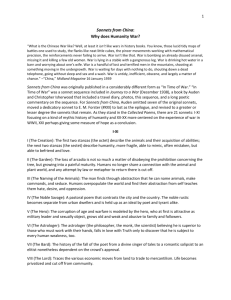THE BIRDS AtTn THE BEASTS ... A STUDY OF THE USE ... TIIE -DRAr:AT Ie POETRY OF "r1. H. ...
advertisement
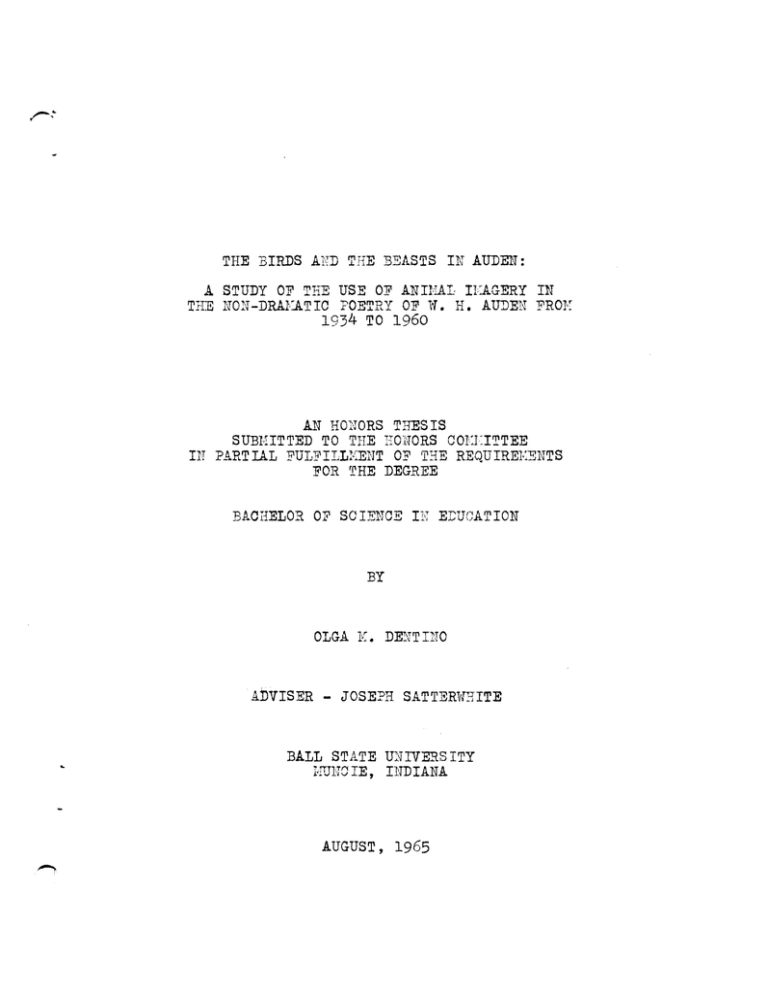
THE BIRDS AtTn THE BEASTS IN AUDEJ:1:
A STUDY OF THE USE OF ANHiAI IEAGERY IN
TIIE l\fO~J -DRAr:AT Ie POETRY OF "r1. H. AUDEN FRO}:
1934 TO 1960
AN HONORS THESIS
SUBHITTED TO THE HONORS CO:r:r:I~TEE
lIT PART rAL FUIJFILL!·::ENT OF T3E REQUIRE1-:ENTS
FOR ~rHE DEGREE
BACHELOR OF SCIENCE
E~
E:GUGATION
BY
OLGA K. DF-'JT INO
ADVISER - JOSEPH SATTER1ir~nTE
BALL STATE U~IVERSITY
I,lUNarE, INDIANA
AUGUST, 1965
TEE BIRDS
A~m
TEiE BEASTS IN AUDE1r
The rerutation of W. H. Auden as a poet rests not
on the publication of several widely quoted and anthologized
poems, but on a consistent and diversified output of
technically
e~·~cellent
years (1930-1964).
and relevant poetry over a nu!::ber of
Though l;:an;.r of Auden t s individual
~:oems
and lines are neDorable, it is rather the recurring patterns
of his imagery which catch and hold the attention of his
readers and critics.
This paper will attempt to deal with
one aSl_ect of Auden t S imar:;cry:
his 1:!::ages of t::e animal
world, and to trace the changes
i~
this imagery as it
corresponds to Audents ideological evolution froe the
position of left-wing, near-Marxist to his positive
acceptance of Christianity in the early 1940's.
Thouc;h much has been written about various images
which perrr,eate the poetry of
'tT.
H. Auden--tllB early
l)ervasi VB 1mrfare I:;otif, t!:e detective and spy inagery, and
the Rilke-like Ithul!lan landscape" technique--crit:.cs have
for the most part ignored uhat Randall Jarrell called
Auden's "endless procession of birds and beasts"l as the
- - lRandall Jarrell, t1Changes of Attitude and Rhetoric
in AUden's roetry", Southern Reviel", Autumn, 1941, :po 329.
2
subject of more than passing reference.
this lack of
attentio~
The reason for
is probably that in AUden's verse
anin:als, plants, and other non-human elements are not of
prime irrportance.
They forn, in his words in Letters From
Iceland, "a background for a torso. tl2
as a corrparative device.
He uses such imagery
The flora and fauna of an Auden
poem are not merely themselves, but archetypal images uhich
are moralized in order to focus the reader's attention on
the human co:r:dition.
Auden is not interested in "ricturing l1
a bird, a horse, or a lion nor is he interested in having
his reader "see" thee in a pictorial sense.
intensely man-centered:
His poetry is
IIArt's subject is the human clay.,,3
His birds and beasts, therefore, are held up as corrparisons
to man in a moralistic frame of reference.
The lion is
"innocent", ducles tlindifferent lf , birds tltearless", while
their salient physical qualities go unmentioned.
ju}:taposl~d
They are
\'11 th man in order that the human dilemma be
underlined by contrast.
Despite the fact that the "creatures" in Auden's
poetry have been ignored in criticism, hm,rever, does not
mean
t~lat
they necessarily playa very minor role.
One
of the continuing dramatizations of t112 human condition in
Auden's poetry is the contrast betueen the animal world and
the world of nan.
This contrast is not to be overlooked
2vT • -H. Auden and Louis !·:acHiece, "Let~cr to Iiord
Byron, Part III, Letters From Iceland, London: Faber and
Faber, July, 1937, p: 103:---
3~.
3
even when it appears to be incidental or
i~3
for it
~erely
decorative,
relevant to a full understanding of a given l)Oem
and to the poet's ideological frame of mind.
III one of Auden' s best knm-m and most highly
antholog:Lzed poer:;s, "1,:usee de Beaux Artslt, occurs significant
and for the most
~part
unnoticed statements of the condition
of man as contrasted Iii th that of the beasts.
Here Auden
notes that even tldreadful ILartyrdom tl occurs Ifin SOIDe untidy
spot/ Where dogs go on with their doggy life and the
torturer's horse/ Scratches its innocent behind on a tree ll • 4
"/'Tri tten at approximately tl1e time of Auden I s conversion to
Christianity, this poe1:, can be seen as a pivotal point in
Auden's animal imagery corresponding to his change in
ideology.
The nature of t 1-ds changing imagery will (hopefully)
become nore apparent as this T:a::;er progresses through a
discussion of the animal motif as eLlployed in various poems
in Auden' s non-dra2atic poetry frOIl' the 1934 PoeILS to Homage
to .Ql1£, published in 1960.
In the Poems of 1934, Auden's emphasis is on man at
war.
Warfare is
hUman condition.
e~ployed
as the chief metaphor for the
"Well are a small band of determined nen
fighting on against the "priggish waystt5 of English society.
London:
~i.
H. Auden, "l:usee de Beaux Arts", Another Time,
Faber and Faber, June, 1940, p. 34.
:n.r
HAd
•
U en,
Faber, 1934, p. 42.
l'i.
··~·"II" , P oen:s, L on d on:
roem -'."-
tl '"'
Faber and
4
b~;r
"They" are
complace~t.
far t:'le more numerous, but they are more
We are the riskers, the questers, those who
dare to endure "heat of day and winter de.!l.eer,/ Journey from
one place to another." 6
victory.
vTe do have a chance for total
Society can be changed if the individual vTill
dare to risk, vJ'ill dare to love.
The r:letaphor is t'lrTo-edged,
of course, each r::an is, in a sense, at uar with himself.
Anxiety is
~:an I
s typical state, and it is only by love, an
instinctual kind of love that he can gain the completeness,
the perfection of the ani:'1als •
That this is possible shows
an early o~timisD 1n nan's ability to gain the "evolutionary
securi tylf of the aninals \'J'};ich later Auden poems do not exrress.
In this early volume, evolution is an underlying
the~e.
Ean is still linked to the animal ..,rorld, and he rer:enbers the
linkage.
In Poem IX, an invalid
in~ended
as the prototype
of a sic}: man in a sicle society asks of life, "What does it
mean?
ifhat are He going to do? tl 7
No answer is forthcoming,
but he recalls his heritage in the evolutionary pattern,
II
In my veins there is a \'rish, and a :DeI:iOry of a fish" and
hopelessly concludes that man has COLe "a very long vTaY to
prove/ No land, no water, and no love."
Love is the missing
element; the lack of it is the gap wtich severs man from his
animal ancestors, 1l'..a1\:es hir:-: anxiety-ridden and sick.
6Ibid., ttPoem
7'
p.
46.
Ibid., "Poem IX tt , p. 18.
5
--
In XXVII of Poems, the necessi t~r for man to remember
-
his evolution from the lower forms of life is noted.
Memory
must restore to man the "steps a.nd the shore,/ The face and
the meeting place;1t and must renew in hiG the animal's
unquestioning and al'l'lays proper obedience to the laws of
nature, ("And sheep obey/ In a sheep's way;").8
functio~.
It is the
of love to ttrer;ember the question and answer,/
For lOVE! recovers/ '\'That has been dark and rich and warm all
over. tt
1"hether or not man can accomplish this is doubtful
in this
~oem
("Can love remember?") which ends on a note of
questioning; but in Audents thinking at this time it was
apparently not impossible.
In poem XVI of the 1934 volume, the persona sits
gazing at a "colony of duck" in a public park and admires
them as they bask and preen themselves or simply sleep in
the sun.
They are indifferent to hila and to the "anxiety
at night, shooting and barricade in street"9 which is the
cause
o~E'
enough."
his unquietness.
For them
tI
sun's luxury
[iv
Here a basic difference in Audents animal and
hunan vlorlds is discerni ;;le:
the lack of serenity and
peace in man as contrasted with the perfect serenity and
cor;;pleteness of the animal vlorld.
The creatures accept
life, nature, what they have been given, unquestioningly
without asking for more.
8"Ibid.,
It
Man, however, is suspended between
Po erI~:O::VI I," p. 49.
9 Ibid ., "Poem XVI, t1 p. 28.
6
--
-
two worlds, his purely aninal heritage from his evolutionary
past and the rational and s)iritual world.
Because of this
he must suffer the "necessary error" of choice and be
constantly alone.
But he can choose to follow the dictates
of love, not a simple love which is merely "the admiring
exci tement of union", but that love
w:~:Lch
b!'ings "death of
It is a hard
grain, our death,/ Death
course of action, but it is the only way.
In this early volume of poetry Auden' s animal irr!asery
S~lOYTS
a
~:lo:0eful
1'1ish for t1.1e r,ilenniuI1.
Its attainment is
possible although the choices necessary to r,ain it are not easy.
The "duck's indifference" is cor::::iared to "that friend's
hysteria."
explicitly
The animal lTorld in this poem is, if not
tt
better", at least
peaceful tl:an the
~luman
iD~)lici tly
better and Twre
state.
In Letters from Iceland (1937), a travel book l..;hich
Auden wrote Hi th Louis I:acUiece, a sin:i1ar concept is
expressed.
The "Letter to R. II. S. Cross:rr:an, Esq. tI, contains
a reference to "The ponies ••• who never will grow up to
question/ The justlce of their permanent discipline. tlll
The persona,
~10viever,
does question man's discipline
thoush he makes no judgEent ("Justice or not, it 1s a world")
and rostulates that each :rean shares a CO!lJ:lon human-ness,
lOIbid., p. 32
llAuden, "Letter to R. H. S. Crossman, Esq.", Letters
From Iceland, OPe cit., p. 91.
7
-. .
("however far we've wandered/ Into our provinces of
:persecution/ 1·rhere our regrets accuse, vTe keep returning/
Back to the common falth ••• Back to the hands, the feet, the
faces.,,)12
But man, unlike the unquestioning ponies, has
"dissented" from his nature.
Historically oriented he sees
nothing but the la'lT and order "and forgets" the rusting
apple core we're clutching still"13_-the symbol of man's
comn:on mortality B::1d hur.iani ty.
Here occurs another of
AUden's fra.mes of comr2.rison--l1an must see himself historically;
the creatures of the animal world are totally without history,
tradi tion, superir:lposed
in Letters
~
tt
Im'l and order".
While the poet
Iceland has not yet CODe to vievl the
dichotorr.y bet"'(rleen beasts and the man as one of
tt
evil," the idea of the animal Horld as
II
It
good lt and
in...'1ocent, II at
least of knovl1edge of its past, has begun to appear.
In his "licht verse".
Let~
adds another qualj,ty to his beasts:
That ch11dren share
'\{i th
to
~
Byron, Auden
"The unself-consciousness/
animals and peasants" .14
The
creatures lack self-reeard, the typical attribute of adult
man.
This unself-consciousness 1-7hich is evident in infants
and children eventually tI s inks in the 'sturril und drang' of
adolescence;tI The result of its disappearance is the selfloving, self-conscious anxious man.
~~ether
Auden intended
the ",easants" as an exception to ttose who exist in the
121.1219:,.
13Ibid., p. 93.
14Ibid ., "Letter to Lord Byron, Part IV", p. 208.
8
-.
hun-,an dilemma is debatable.
Since Auden very often uses a
stereotyped image in order to make a contrast, it seems more
likely that his peasants are, as in the popular conception,
child-like, simple images without the intelligence or
so~histication
to have
develo~ed
self-consciousness.
They
are not the tvTentieth c3ntury man ili th uhose plight Auden
deals; but in a sense, out of the rr:ainstrear.'l of human
activity, as are
On This
volume.
c~ildren.
Island, published in 1937, is a transitional
In it Auden Ea1ces nore frequent use of animal
imar-;ery and atteI::pts to diagnose man t s
pli[';:~t
from the lack of "love that makes impatient/
as resulting
t~e
tortoise
and the roe, and lays the blonde beside the dark. 1t15
Animals in their finished perfection obey unquestioningly
tl:e dictates of this law of love.
By comlJarison man,
unfinished and imperfect, feels tlHow insufficient is/ the
endearment and the look", the perverted or sU'Perficial
kind of love which
~an
tries to use as a sUbstitute.
Man
is by his nature condemned to ItLose fhi~ loves,/ on each
beast and bird that moves/ Turn an envious 100k. tl16
is envious of the "ifhi te perfection ll of the
Sl.fan,
He
of the
fish's sereni tJ' in "unruffled lakes" and of tb.e great lion
who walks in his "innocent" grove.
Each possesses umdlled
Ie;..
""VI tt, n
0 T'.!
-'We HAd
U en, lip oem.:..
ll.lS Island, New York:
Random House, 1937, p. 41.
-- ---1.
l6~., "Poem XXVII, II p. 60.
9
-
and unconscious perfection, 'Y111ile nan, because of the
absense of love "must v1eep and sing/ Duties conscious
wrong,/ The devil in the clock."
There is
ho~'e
for man, hm-rever.
In poem XXVII the
gift of "voluntary love" bestowed by r2an is that quality
which allows him to surpass the creatures whose perfection
was the unearned and unasi::ed for gift of "Impulsive Nature. 1t
1·:an t s achievement of love is not a gift, but the result of
risk, of his daring to choose to love and to offer that love
voluntarily.
It is an answer to his dilemma, but it will not
make him Itlike the animals. 1I
Here Auden first makes the distinction clear and
irrevocable.
l·~an
His situation is
cannot gain the perfection of the creatures.
u~ique
and the resolution of his
dile~~a
must be also uniquely human.
Poex III of On ~ Island17 also contrasts the
finished perfection of the creatures I'Ti th the human condition.
Han ironically r:i ties t'!1e animals for ti.leir limitations vl":lich
are unfortunately set in their IIfinished features" and cannot
be changed.
If only "reason's gift" could be sorr.ehow given
to them, "the lion's intolerant look" and "the quarry's
dying glare" i'lould gain articulate expression in the quest
for personal glory.
Reason would add "The liberal appetite
and power,/ The rightness of a god."
reason
-
~:eems
Surprisingly, however,
not to have done this for humanity.
It has
so modified love in the hunan condition that it is "suited
l7Ib~d
~ 17 •
- l . . , II~
~ oerr, III" ,
2.>'
10
-.
tol the intricate ways of guilt" and made it man's "mature
arrbi tion/ To think no thought but ours ,I To hunger, worle
illegally."
Again Auden stresses the inability of 12an to
gain the moral serenity of the beasts.
.As the beasts do
not possess reason, so man cannot divest himself of it.
The cleavage is
perJ:~anent,
and [",an's situation is singularly
his own.
"Casino" in On This Island pictures an Audenesque
wasteland.
Here E.an is lifeless but for his hands l-[hich are
"To the wheel attracted, ••• moved as deer trek desperately
towards a creek."IB
desperate deer.
In this instance, man resembles the
But the deer behave as they do because
they cannot do ot1:erYTise.
For man there is a choice.
He
has coree "to this last feast of isolation self-invited" and
prefers perpetual security ("The labyrinth is safe but
endless") to the unsafe lmt "wholly living" 1forld outside
which could be gained by a
com~itment
to love.
The
ani~als
are part of a world that is verdant and alive (lithe bird/
Deep on the greens and moistures of sUEwer,1 Sings toward
their vfork") but it is a separate 'l'forld.
~Journe:r
Isherwo:)d,
vofaS
to
§!.
"i{ar, authored by Auden and Christol)her
pul):!..lshed in 1939.
It contains a sonnet
sequenc'8 in vThich Auden again compares the conrleteness of
the animals to man 'l'Tho must choose and is respons i ble for the
l8Ibid ., "Poen: XXV," "Casino," p. 5B.
11
--
consequences of his actions.
In Sonnet I the anirals are
crea ted and show'ered ',1i th gifts:
at once :lnto his l:'..fe:
IIEach/ Ran off '1Ti th his
/Bee took the politics t:i.1at r:a}ce a
hive,/ F:ish Sl'Tam as fis;1, peach settled into peach./A.nd
,fere suct:}essful at tZ1C first endeavour; 1119 They vlere sat isfied
and at peace \-ri th their "precocious kU01fledge" and "knew
their station and ifere Good f'orever."
Then enter man, a
"childish crea ture tl wao had the peifer of imi ta tion and oould
tt fake "with ease a leopard or a dove".
powers were only
s~am
W'orld of the beasts.
But his in:i ta ti ve
and OQuld never connect hil with the
l':an is by his nature condemned to be
"sha:cen" by the "lir;htest lfind, n to search for truth and
be ali-rays 1-Trong, and to envy his friends and "Choose his
love. n
In Sonnet II, a distinctly Ohristian tZleme is adopted.
Ean, having been close to nature, was shut off froD it:
ttThey c::mld not understand/ The dogs n01-[ lI110, before, had
always a.ided;/ The strean vms dUL'1b vfi th I-Thorn the Jr' d c.hrays
planl1ed. ,,20
Cast out from the perfect "\'rorld, man was free,
but he lIi-rept and qua:::-relled:
freedoD
vTaS
so i'Tild."
Looking
back to Eden TtTith envy, he found that "the 1-Tay 'back by angels
was def€mded." / Man I s freedom has made hin lL11a ble to
corr..rr:unica te
~·ri th
nature and the creatures.
no re -unifica tion of the
Journey
'i:;'iT(J
There will be
-:Torlds.
19W• H. Auden and Christo~;her Isheri-Tood, "Sonnet I,"
t~ £ ~,London:
Faber and Faber, 1939, p. 259.
20 Ibid ., "Sonnet II, II p. 60.
12
-..
In a verse "CO:clEentary" in Journey to .§;. iflar, Auden
makes aiirect statetlent on the per![anence of man's
irnr,erfection.
"l-1an are not innocent as beasts and never
can be, I }hn can i::n~;rove hi:::2self but never )·[ill be :perfect!121
Written at a-pproxinately the tir;;e
o~
Auden's conversion to
Christiani ty, t~~is forns 1fi th tlKusee de Beaux Arts lt a
frameT,'rork for Auden t s conception of the ,'Torld of the anirJals
as opposed to
t~at
of nan.
Of the tT,-TO, "Huse; de Beaux Arts" 1'7i th its oftignored lines pertaining to t1Je creatures is probably more
defini ti ve in comparing tlJe innocence of the anilrals to the
guilt of man.
The dogs who "so on vTith their dogf~Y life,"
and "the torturer t s horsel fjrhoJ Scratches his innocent
behind on a tree"22 seem at first glance to be such banal
and ordinary manifestations of the indifference of the
animals to the suffering of man as to be unworthy of mention.
A closer reading of the poem, however, shows in these lines
the com:parison of natural innocence 1'1i th the perpetual
guilt of' man and a Christian nostalgia for the loss of
Paradise.
to
§:.
l'~an
has been
C8.f]t
froD. Eden (So:nnet II, Journey
We!.!:) but his exrulsion '2as l)rought u})on him not merely
confusion and frustration, but the kno",1edge of his
sinfulnE~ss
and the dilerlIna of choice.
21Ibid ., "Colnmentary," p. 298.
-
22Auden , "Kusee de
:JS!8.UX
---
Arts,1I Another Tine, on. cit.
-
-
13
-
tI
The dogs' life in Itl;:usee" is doggy because dogs have
,
no choice but to live in this way. A uden even uses the
singular "life" instead of tllives tl in order to indicate the
sameness of the pattern of life among each species.
No
variance from this pattern is possible, and none is sought.
The innocence of the horse is by analogy the innocence of
all trIe animal w·orld.
He is indifferent to the "dreadful
martyrdom" wfhich occurs so near in the human i-Torld.
The
dogs and the sun ("the sun shOi-m as it had to") are also
oblivious to human misery, but the horse particularly
indicts mankind.
torturer's horse."
Auden makes him deliberately ttthe
Surely no clearer exam:ple of the fjuilt
of manktnd can be found than in one I-vho tortures his fellow
human beings, and no characteristic is quite so
ty~ical
of
man and so absent fror, the creatures.
In a poeD :published much later in .!ill:. Shield of
Achilles, (1955), a similar contrast bet1-1een e;utlty humanity
and the innocence of the beasts occurs.
"After shalcing
pa1is vlith his dog/ (iihose bar}...:: would tell the ,'Torld that
he is always kind)/ The hangman sets off briskly over the
heath."23
Th e t or t urer an d th e 'nangman are tne
. proto t ypes
of guilty humanity after the Fall.
After Auden1s conversion to Christianity the ther:e of
man's Guilt becomes increasingly prevalent.
--
York:
In Poem XXIV
23yT. H. Auden, "Terce," The Shield of Achilles, New
Random House: 1955, p. 50.
14
-
,
man must 1001i: on in hopeless envy at "the stri:ped and
vigorous tiger" who "can move/ With style through the
borough of murder;" and tbe ape who "Is really at home in
the parish/ Of grimacing and licking,"24 all the while
knowing that he has failed to learn anything from the
natural "I"rorld because of his OHn self-love and guilt
0
The guilt is ver':/ real for "even our art.1ies/ Have to
express our need of forgiveness. 1I
Though Auden can still say in Poem III ("The Creatures 1l )
of Another -Tin:e that the animals nare our nast
and. future tt
.
and that "Their anpearances amid our dreams of machinery
have brought a vision of nude and fabulous epochs t12 5
"lihich man may yet regain ("But what their :pride has
retained, "fe may by cl:ari ty more generously recover.It),
the per"TBsive theDe of tj1e animal imagery of Another Time
is the invidious conparison of guilty humanity with
innocent creature-ness.
publishE~d
This eITphasis continues in Nones,
in 1951, The Shield of Achilles (1955), and
Homage j;o Clio (1960), though
VIi th
some gradual changes in
tone.
"Their Lonely Betters" in Nones again stresses the
differences between the \-rorld of man and that of the beasts.
Not one of the birds to which the persona is listening
"Poerl: XXIV," _A_n_o_t_h_e_r T1me, .£Eo cit 0, p. 39.
-
25Ibid.,
"PoelY: III," "The Creatures," p.
7.
.
15
-.
"w'as capable of lying ,/ There i'TaS not one ,\-Thich knew that
it was dying/ Or could have vri.th a rhythm or a rhyme/
Assumed responsibility for time. u26 Language, then, he
postulates, is rightly left to the birds' "lonely betters"
who are faced with choice and cursed with consciousness
of time and death.
The birds in their careless perfection
need assuce responsibility for nothing; man, on the other
hand, has "prordses to keeplt and must accept the consequences
of l'iha t he doe s.
In tiThe Love Feastl1 the innocence of the animals
becomes an obvious theme:
ItAdrian's pleasure-loving
dachsund/ In a sinner's lap he's curled;/ Drunken absentminded fingers/ Pat a sinless world. 1127 Here Auden
pictures a perverted gathering of neurotics, liars,&nd
hon:osexuals.
The dachshund presents a sharp contrast to
these practicers of "love according to the gospel/ Of the
radio-phonograph."
The dog is Itpleasure-loving" as are
the people at the feast but with a difference.
He is
part of the "sinless world" which in their perfection
love what they lI;USt love.
I:an, on the other hand, must
choose to love not lIe rely pleasure, but his felloli man.
This the revelers ln "The Love Feast lt have obviously not
done and are, therefore,
It
sinners. II
The s'reaker in the
2~f. H. Auden, "Their Lonely Betters, tI Nones,
-
New York:
Random House, 1951, p. 18.
27Ibid., "The Love Feast,1I p. 21.
16
,-
,
poem is a typical example of abdicated
and the -;qeakness of man.
res~onsibility
He asks to be made "chaste" but
is not sincere in his request, for he adds the invalidatine
phrase "but not yet" to his prayer for self-improvement.
He wishes to enjoy his sins for as long as possible
without the permanent loss of salvation.
In "The Fall of
Ro~e"
the contrast is Dade once
again between the birds l"I"ho are "unendowed -yri th vieal th or
pity"28 yet are beautiful in their completeness, and man
who is sick and incomplete.
In this poem man lives in
the "flu-infected cities" of decaying
Ro~e
unable to glean
help frorr the animal world w"hich is "a1 toe;ether elseiihere"
and as totally indifferent as it is totally beautiful:
"vast/
~erds
of reindeer move across/ Miles and miles of
golden moss,/ Silently and very fast."
In "The Hanagers tt Auden vie"l'fs ,vi tIl sorcething like
nostalgia the state to which the "rulers ll of society have
correa
Instead of heroic figures whom a painter would
not hesItate to paint "rising triumphant from a lake/
on a do19hin TIfl.ked,/ Protected b J' an ur.lbrella of cherubs"29
those who today decide how we live and die are "suct quieti
lolen, \-forking too hard in rooms that are too big,/ Reducing
to figures/ What is the natter, what is to be done."
They are juxtaposed 1-'ii th the world of nature:
~~8Ibid.,
II
The Fall of ROllie, It p. 32.
29Ibid., I1Tr.'.e r.:anagers, II !). 36.
"woods
17
unaltered by our wars and our vows" and the uncaring
•
animals ("the songs of birds who will never vote") •
The natural vwrld :s indifferent and unchanging 1Thile
man
:3.1 tered hiLself for the "liOrse.
112.S
In The Shield of Achilles the tone of Auden's
animal iraage ry iss 0:le1-111a t 1 j ghter •
In "Winds n
It
one
bubble-brained creature lt philosop?lizes ItI ala loved,
therefore I am"30 but the vlOrld fails to heed this logic
so the lion does not "lie dovffi 11i th the kid. It
The logic
of love has not iml";ressed itself upon humanlcind, nor
apparently has it iTi'pressed itself upon the animals
which here appears to be removed from the perfect ii'orld
by the separateness of the species.
In two more -DoellS froD The Shield -of Achilles
.
the a bj:~i ty of man to iroi tate though not equal the anim8.1s
is again a theL~e. In ttlIotmtains" man is "an uncat1ike
creature 'd'ho has :,;one I'rrong tl3l and his attei ,lJL; to be
like the animals cause h1m to admit that it is impossible:
ttFive r::.:inutes on even t:-:e n:Lcest mountain/ Is awfully long. II
In "The Truest Poetry is the I'lost Feigning tl the poet
cOD~ents
on the condition of Dan:
"For given man by birth,
by education/ Imago Dei i'Tho forgot his st2~tion/ The selfreadc creature who hirr:self unmakes ,/ The only creature
3 0 Auden, "Winds," T:t1e Shield of Achilles, .9..£. cit.,
-
p. 11.
31Ibid ., "Hountains,11 p. 18.
18
ever made who fakes."3 2
The tone of these two poems and,
indeed, of much of the poetry in The Shield
.21.
Achilles
tends toward an acceptance of the condition of man.
Unlike his
ve2.~y
early poetry which dramatizes the close
evolutionary link betv-Teen n.:an and the animals, later
Auden verse (On This Island, Another Time) admits the
permanent separation between the two worlds and views
the creatures 'Ivi th a Christian nostalgia:
are l}art of a better 'trorld
"That must man do in this
wh~ch
the animals
man can never attain.
s~ tuation?
ITe must seek his
o..rn salvation through love and through faith (Christianity,
though Auden is not didactic about it).
:By the time the poet 1mblished Homage to Clio
in 1960, he was able to view Dan's situation with a calm
acceptance, even to view it as perhaps preferable to that
of the an irr;al s •
In t2'le title poerr: of
t~"'.is
volur::e, the
persona a';va}{ens ttto hear a cock pronouncing hin~self himself/
Though all his sons had been castrated and eaten."33
But rather than envyinG
as the )ersona in roer::
t~e
::vr
calr: acce})tance of the animals,
of trie 193 1{- Poer;:s does in an
almost identical situation, he Is "glad /.he] could be
unhappy."
He rejoices in man's right "to visit/ tll.e
grave of a friend, to
ma~\:e
an ugly scene,/ To count the
loves one has grOlID out oft! even though these thj.n:3:s are
-
-"32l.£iS!.o, liThe Truest Poetr;;t is t~e l:ost Feigning,"
p. 44.
33,;.,. H. Auden, "Homage to Clio, It Hona.s,e
New York: Random House, 1960, p. 4.
.!2.
C,liq"
19
"- .
t1
no t nice."
The alternative to them "to chirp like a
tearless bird,/ as though no one dies in particular/ And
•
gossip viere neV'3r true" is "unthinkable."
If man could
act in this way then "forgiveness would be no use,/
One-eye-for-oue would be just and the innocent/ Would
not have to sUffer."
It is man's unique privilege
(not curse) to use his powers of reason, to be able to
confront Clio, the
~use
of history, and to come to grips
wi th his condition in a uniquely conscious and hu.'11an 1'1ay.
Still mortal, still guilty, man in "The Sabbath"
returns on the Seventh Day of Oreation after a short
absence during which the creatures have decided "that
fel101-T had never reall:'r sr:elled/ Like a creature
~vho
would
survive./ No grace, address or faculty like those/ Born
on the first five.,,34
Life without him is "beautiful,
happy," but it is also "perfectly pointless."
A gunshot
heralds :J::an' S return to the horror of the beasts.
the poet speaks out strongly for humanity.
"For whom d1d they think they
~lad
which caused the expulsion
fro~
After all,
been created?1t
was for r:1an that Eden had been y":ade.
existenc~of
It
The felix cull'a
the garden is a fact.
Han stands midway bet,ieen tvvo polar extremes:
unconsclous, beautiful and in
But
theL~sel ves
the
purposeless
the animals and the spiritually perfect
•
world of the gods.
-
He is
bot~
worse and better than he should
34 Ibi d., "The Sabbath," ':".
12.
-
-
20
-
be, "more bloody minded than they lihe creatures-'
t
-
remembered/ More godlike than they thought."
So man is
not, will not be perfect, but there is in him that which
is godlike and the poet seelLS to say in Horrage to Clio
with considerable rrore hope and acceptance than he had
said in On This Island
11
It's a world.
It t S a way. It 35
From 1934 to 1960 W. H. Auden's ideological position
had evolved from that of left-wing Marxist sympathizer,
(1928-1937) during which the problems of mankind were
diagnosed as societal and the milennium to be gained by
the modification of society, through a period of humanism
which stressed the lack of love as the chief ill of the
individual and
he~ce
the chief evil of society.
he had become a converted Christian.
By 1941
The ills of human
condition sprang from a lack of Ohristian faith. 36
As
he changed,his metaphorical comparisons between the animal
and human worlds also change.
The possibility of regaining
the perfection of the animal i'Torld voiced in the poer[:s of
the early 1930's [Sradually pives way to a realization of
the irreconcilable cleavage betl<veen the two worlds,
eventually portrayed with a Ohristian nostalgia for the
lost Eden.
"l,:usee de Beaux: Arts" shows this c11ange in
the picturing of the animals as innocent and humankind
•
--
35Auden, "Epilogue/I On ~ Island, .2.£. cit., p. 68.
36Kay Olark, Leap Before You Look, The Theme of
~ in the Poetry o~ ~. Audell:-1r.as:ters TheSis, Ball
State University, p. 20.
21
as guilty.
The Christian position is later, in The Shield
of Achilles and Horr.age to Clio, expressed )'Vi th more acceptance and finally a quiet kind of rejoicing in
uniqueness of the hunan condition.
t~e
Each of these stages
of Auden' s ideological co!::rci trJent figure imI)Ortantly in
his poetry.
Those poems used in this paper have been
chosen to demonstrate the nature of this
ideolo~ical
change, as mirrored in his use of beast imagery.
The
feeling of the author of this paper is that this device,
the comparison of the animal world to that of the human
world, is one of importance in Auden's works and one
which should be understood for a thorough understanding
of his poetry.
It is hored that this p&per has added
to this understanding •
•
-
22
.
BIBLIOGR..A..PHY
Auden, 'l'Tystan Hugh, Another Time, nevI York:
Rouse, 1940.
___ • Eomafie to .91.i2., New York:
Random House, 1960.
___ • 8.nd .Chr:'stopher Isherwood, Journey to
New York~ Random House, 1939 •
---
RandoLl
Q;
War,
• and Louis MacNiece, Letters from Iceland, New York:
RandoL: House, 1937.
--
___ • ;Nones, New York:
Random House, 1951.
___ •.On This Island, NevT York:
--- •
Poems, New York:
Random House, 1937 •
Random House, 1934.
___ • 'rhe Shield of Achilles, New York:
Random House, 1955.
Beach, Joseph ;Jarren, The I,raking .£f. the Auden Canon,
Mlnnea~olis:
University of Kinnesota Press, 1957.
Clark, Key Joan Tharp, Leap Before You Look, Lasters
'rhesis (un:rmblished' l·iuncie, IndIaiia: Ball State
University, 1964.
Daiches, D., "We H. Auden:
r-oetr'Y, June, 1939.
"Faith of
~'1.
H. Auden, 11
The Search for a Public,"
Christian Century, January 16, 1946.
Fletcher, J. G., "Poet of Courage," Poetry,
Hoggart, Richard, W. H. Auden, New York:
Green and C'o., -Inc., 1957.
~ay,
1933.
Longmens,
Jarrell, Randall, "Changes of Attitudes and Rhetoric in
Auden ' s Poetry," Foetry, Autumn, 1941.
-
Norton, D. S., tlAuden I s I'oetry," Y.2.rginia guartcrl;y: Review,
July, 1945.
23
Ohmann, R. 1\1., "Auden's Secret Arre," Commomreal, l·:ay 31,1963.
"Rilke in Eng13_sh, It Ire\-, Republic, Septe;:;-ber 6, 1939.
1
Rosenthal, 1'.. L., "l\;Ir. Auden and Clio," Nation, 1,:arch 23, 1957.
Sanders, E., "Facing the l,:use," Poetry, l·iarch, 1961.
Savage, D. S., "Poet's Perspectives,tt Poetry, June, 1944.
Spears,
}~onroe K., "Late Auden:
The Satirist as Lunatic
Clergyman," Sewanee Review, Winter, 1951.
--- •
"The Dominant Symbols of Audents Poetry," Sewanee
Review, Summer, 1951.
Spender, Stephen, "Seriously Unseriously," Poetry,
September, 1951.
--
· "r1.
H. Auden and Eis Poetry," Atlantic }10nthly,
July, 1953.
Stauffer, D. A. t "y1hich Side aIT', I Supposed to be On?
Search for Beliefs in W. H. Audents Poetry,"
Virginia Quarterly Review, October, 1946.
Untermeyer, Louis, "Change and Gro"'fth of i'l'. H. Auden,"
Saturday Review of Literature, April, 1945.
-----
.,
• "Poetry of PO'fler," Saturday Review of Literature,
November 10, 1934 •
